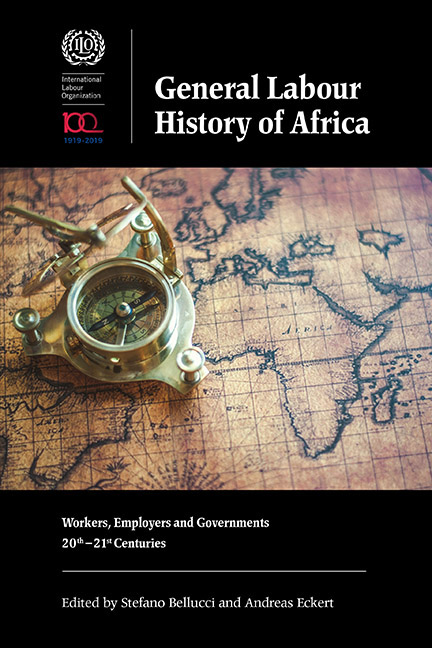Book contents
- Frontmatter
- Contents
- List of Maps and Figures
- List of Tables
- Notes on Contributors
- Foreword
- Acknowledgements
- The ‘Labour Question’ in Africanist Historiography
- Part I Free and Unfree Labour
- Part II Key Sectors
- Part III International Dimensions and Mobility
- Part IV Varieties of Work
- Part V Entrepreneurs and Self-Employment
- Part VI The State, Unions and Welfare
- Part VII Conclusions
- 22 The ‘Labour Question’ in Africa and the World
- Select Bibliography
- Index
22 - The ‘Labour Question’ in Africa and the World
from Part VII - Conclusions
Published online by Cambridge University Press: 21 September 2019
- Frontmatter
- Contents
- List of Maps and Figures
- List of Tables
- Notes on Contributors
- Foreword
- Acknowledgements
- The ‘Labour Question’ in Africanist Historiography
- Part I Free and Unfree Labour
- Part II Key Sectors
- Part III International Dimensions and Mobility
- Part IV Varieties of Work
- Part V Entrepreneurs and Self-Employment
- Part VI The State, Unions and Welfare
- Part VII Conclusions
- 22 The ‘Labour Question’ in Africa and the World
- Select Bibliography
- Index
Summary
This collection of essays is both the fruit of and a contribution to a recent rebirth of interest in the history of labour in Africa. Labour has never ceased to be an important part of social and economic life in Africa, but serious research on the topic has wavered. With some notable exceptions – especially among specialists on southern Africa – historians had lost interest by the late 1980s. The trend was not unique to Africa; indeed, it was part of a crisis in Marxist scholarship and social history and sociology more generally. Scholars are as fashion conscious as anybody, and they often follow trends – be it the ‘cultural turn’, the ‘linguistic turn’ or the ‘imperial turn’. Interest in labour's past has long been associated with an interest in labour's future – with projects of social reform and social revolution. The collapse of the communist alternative to capitalist hegemony had much to do with the disaffection at century's end of leftist scholars from political economy. Much of the energy of progressive scholars that had once gone into such subjects went in other directions.
The struggle to liberate South Africa from apartheid and the hopes vested in the post-1994 future kept the subject alive in that part of Africa. More generally, the International Institute of Social History and journals such as International Labor and Working-Class History and Movement Social tried to keep labour and social history alive. In the last decade or so, labour history has revived, but with different emphases. The Centre for the Study of Labour and Life Course in Global History at Humboldt University in Berlin has since 2009 brought together scholars with an interest in the subject for regular conferences, summer academies for advanced graduate students and post-doctoral fellowship years. Perhaps the revival of this domain of scholarship has something to do with the cyclical nature of scholarly fashions – as new trends prove themselves no more able than older approaches to provide a convincing way of looking at the world. Perhaps the moments of citizen mobilization in certain African countries have encouraged renewed attention to popular mobilizations of different sorts.
- Type
- Chapter
- Information
- General Labour History of AfricaWorkers, Employers and Governments, 20th-21st Centuries, pp. 617 - 636Publisher: Boydell & BrewerPrint publication year: 2019



